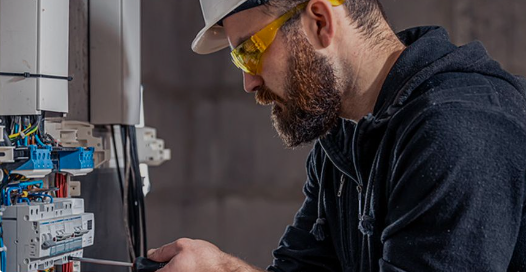Illuminating Electrician Job Opportunities: Wiring a Bright Future

Electricians are skilled professionals who specialize in installing, maintaining, and repairing electrical systems. Their expertise is essential for ensuring the safe and efficient operation of various electrical components, from wiring in homes and commercial buildings to industrial machinery.
The Ubiquity of Electricians in Modern Society
In our technology-driven and electrified world, the role of electricians is ubiquitous. From powering homes and offices to enabling industrial processes, electricians contribute to the backbone of society’s infrastructure. This article delves into the diverse job opportunities available for electricians, exploring the different sectors and specializations within the field.
Education and Training for Electricians
1 Educational Pathways
Becoming an electrician typically involves a combination of formal education and hands-on training. Many electricians start with a high school diploma and then enroll in apprenticeship programs or vocational schools. These programs provide the theoretical knowledge and practical skills necessary for the profession.
2 Apprenticeships and On-the-Job Training
Apprenticeships are a traditional and valuable route for aspiring electricians. During apprenticeships, individuals work alongside experienced electricians, gaining practical experience while earning a wage. On-the-job training is a crucial component, allowing apprentices to apply theoretical knowledge in real-world scenarios.
3 Licensing and Certifications
In many regions, electricians are required to obtain licenses to practice professionally. Certifications, such as those offered by the National Joint Apprenticeship and Training Committee (NJATC) or the Independent Electrical Contractors (IEC), can enhance an electrician’s credentials and open up more job opportunities.
Roles and Specializations in Electrician Careers
1 Residential Electricians
Residential electricians focus on electrical systems within homes and small apartment buildings. Their tasks include wiring installations, electrical repairs, and ensuring compliance with safety codes. They may also install lighting fixtures, outlets, and home automation systems.
2 Commercial Electricians
Commercial electricians work on larger-scale projects, including office buildings, retail spaces, and industrial complexes. Their responsibilities encompass the installation and maintenance of electrical systems to support the diverse needs of commercial enterprises.
3 Industrial Electricians
Industrial electricians specialize in the electrical systems of factories, manufacturing plants, and other industrial facilities. They deal with complex machinery, motors, and control systems, requiring a deep understanding of industrial processes and safety protocols.
4 Maintenance Electricians
Maintenance electricians focus on the ongoing upkeep and repair of electrical systems. They play a crucial role in preventing downtime and ensuring the reliability of electrical infrastructure in various settings, from residential buildings to industrial plants.
Challenges and Opportunities in the Electrician Profession
1 Safety Concerns
Working with electricity poses inherent risks, and safety is a top priority for electricians. Adequate training, adherence to safety protocols, and the use of personal protective equipment mitigate these risks. Ongoing safety education is crucial in addressing this challenge.
2 Technological Advancements
The rapid evolution of technology in the electrical field presents both challenges and opportunities. Electricians need to stay updated on the latest advancements, such as smart home technologies and renewable energy systems, to remain competitive and offer cutting-edge solutions.
3 Job Market Dynamics
The demand for electricians fluctuates based on economic conditions and construction trends. While economic downturns may impact new construction projects, the need for maintenance and upgrades ensures a degree of job stability for electricians.
4 Sustainability and Renewable Energy
The global shift towards sustainability and renewable energy sources has opened new avenues for electricians. Installation and maintenance of solar panels, wind turbines, and energy-efficient systems present opportunities for electricians to contribute to environmentally conscious practices.
Impact of Electricians on Society
1 Powering Homes and Businesses
The most immediate impact of electricians is evident in the reliable power supply to homes, businesses, and public spaces. Electricians enable the functioning of lights, appliances, and electronic devices that are integral to daily life.
2 Supporting Industrial Processes
Industrial electricians play a critical role in supporting manufacturing and industrial processes. They ensure the continuous operation of machinery and control systems, contributing to the efficiency and productivity of various industries.
3 Advancing Technology and Innovation
Electricians contribute to technological advancements by integrating new electrical technologies. From smart home systems to industrial automation, electricians are at the forefront of implementing innovations that shape the way society interacts with electricity.
4 Enhancing Safety Standards
The work of electricians contributes to maintaining high safety standards in electrical systems. Adherence to safety codes, regular inspections, and prompt repairs help prevent electrical accidents and ensure the well-being of individuals and communities.
Future Trends in Electrician Jobs
1 Renewable Energy Integration
The increasing focus on renewable energy sources is expected to create more opportunities for electricians. The installation and maintenance of solar panels, wind turbines, and energy storage systems will become integral to the profession.
2 Smart Home Technologies
The rise of smart home technologies, including intelligent lighting, security systems, and home automation, will necessitate electricians to acquire expertise in these areas. Electricians who can integrate and troubleshoot smart systems will be in high demand.
3 Electric Vehicles Infrastructure
The transition to electric vehicles (EVs) requires the development of charging infrastructure. Electricians will play a crucial role in installing and maintaining EV charging stations, supporting the growth of the electric transportation sector.
4 Continued Embrace of Digital Tools
Electricians will increasingly rely on digital tools and software for tasks such as project planning, diagnostics, and communication. Embracing digital technologies will enhance efficiency and streamline various aspects of the profession.
Conclusion
Electricians are indispensable contributors to the functioning of modern society. Their diverse roles, ranging from residential installations to industrial maintenance, underscore the breadth of opportunities within the profession. As electricians navigate challenges and embrace technological advancements, they continue to wire a bright future, ensuring that the world remains powered and connected.





